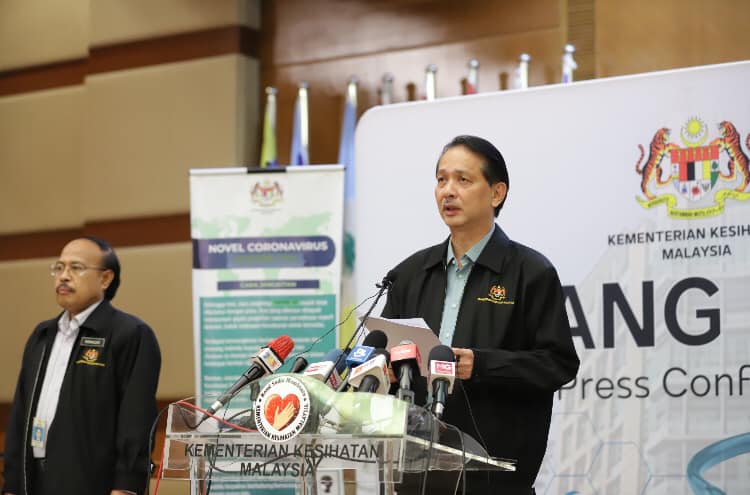KUALA LUMPUR, April 28 — The Movement Control Order (MCO) cannot fully eliminate Covid-19, the Ministry of Health (MOH) said today, as it told Malaysians to face the virus for some time.
Health director-general Dr Noor Hisham Abdullah said MOH would continue virus eradication and control activities, even as health authorities today reported just 31 new Covid-19 cases, the 12th consecutive day of daily increases below 100.
“However, the people’s active involvement is very important,” Dr Noor Hisham said in a statement.
He pointed out that some six weeks of the nationwide partial lockdown has enabled Malaysia to flatten the Covid-19 epidemiological curve, which means that cases do not rise drastically in a short period of time that they overwhelm the public health care system.
Dr Noor Hisham said Malaysia’s active infectious cases now are 1,719, compared to 2,596 on April 5. Active infectious cases are patients who are all put in hospital after testing positive for Covid-19, regardless if they need treatment or not.
“This achievement was the result of the government’s proactive and aggressive actions in Covid-19 transmission control activities throughout the period before and during the MCO.
“This has ensured that MOH facilities can fit the number of Covid-19 patients in Malaysia, including intensive care unit (ICU) capacity and ventilator capacity in hospitals.”
The total number of Covid-19 cases in Malaysia has now reached 5,851 cases, with 36 in ICU, including 17 on ventilator support. One new death was reported today, leading to a total of 100 fatalities from Covid-19.
“Maybe by mid-May, we can achieve single digits,” Dr Noor Hisham said, referring to daily case numbers.
The Health DG outlined four action plans for the government and the public to control the Covid-19 epidemic in Malaysia.
The government, he said, imposed border controls to prevent the entry of possibly infectious foreigners, while Malaysians returning from overseas were placed on mandatory quarantine. MOH has detected 154 confirmed Covid-19 cases among Malaysians who came home from abroad since April 3, all of whom have been isolated and hospitalised.
The government’s second action plan involved movement controls, as MCO 1, 2, and 3 have reduced social interactions and, thus, coronavirus transmission in the community.
“However, the MCO cannot fully eliminate Covid-19,” said Dr Noor Hisham. “In fact, society must be prepared to face this virus for a longer period of time.”
As for the public, they are encouraged to practice safe distancing of at least one metre and to maintain good personal hygiene, like frequent hand washing with soap and water.
Dr Noor Hisham also revealed that Malaysia has tested 152,142 people for Covid-19 as of yesterday, yielding a 4,754 tests per million population rate for a 32 million-strong population. Testing capacity has increased to about 16,635 tests a day, with MOH aiming to further raise capacity to 23,000 tests daily next week.
A total of 11,642 tests were done yesterday, he said, adding that MOH has yet to receive the antigen rapid test kits ordered from South Korea.
“Besides active case detection, MOH, together with various agencies, have used a targeted approach for high-risk groups. This includes measures of detection, screening, testing, isolation, and treatment for individuals in areas under Enhanced Movement Control Order (EMCO); tracking participants of the Sri Petaling gathering and other large gatherings; tracking schools, including madrasah and tahfiz schools; and the like,” Dr Noor Hisham said.
Critics have said that Malaysia may be missing Covid-19 cases in the community as MOH does not do enough testing, unlike other developed countries that run far more daily tests per capita. Paediatrician Dr Musa Mohd Nordin pointed out Friday that Malaysia had a 4.8 per cent test positivity rate in its 3,700 daily tests per million population, compared to 1.9 per cent for South Korea (11,200 tests per million population), and 1.5 per cent for Australia (16,900 tests per million population).








